NUR2203 Acute Care: Colorectal Cancer Care Plan Report, University
VerifiedAdded on 2023/06/07
|13
|3278
|138
Report
AI Summary
This report presents a comprehensive care plan for a 78-year-old patient, Eleanor Wilson, diagnosed with colorectal cancer. It begins with an assessment of potential issues, including fatigue, anxiety, and constipation, detailing interventions and rationales for each. The report then delves into the patient's medical history, including hypercholesterolemia, myocardial infarction, and smoking history, analyzing the impact of anesthesia and potential clinical complications during the 24-hour post-surgery period. The report emphasizes the importance of nursing interventions to identify and prevent clinical deterioration, highlighting the need for monitoring vital signs and understanding the patient's medical background. Finally, it outlines a discharge plan, emphasizing the information and support needed to prevent recurrence, including follow-up care, symptom management, and regular examinations such as sigmoidoscopy and CEA/CT scans. The report aims to provide a holistic approach to patient care, from initial assessment to post-operative management and discharge planning.
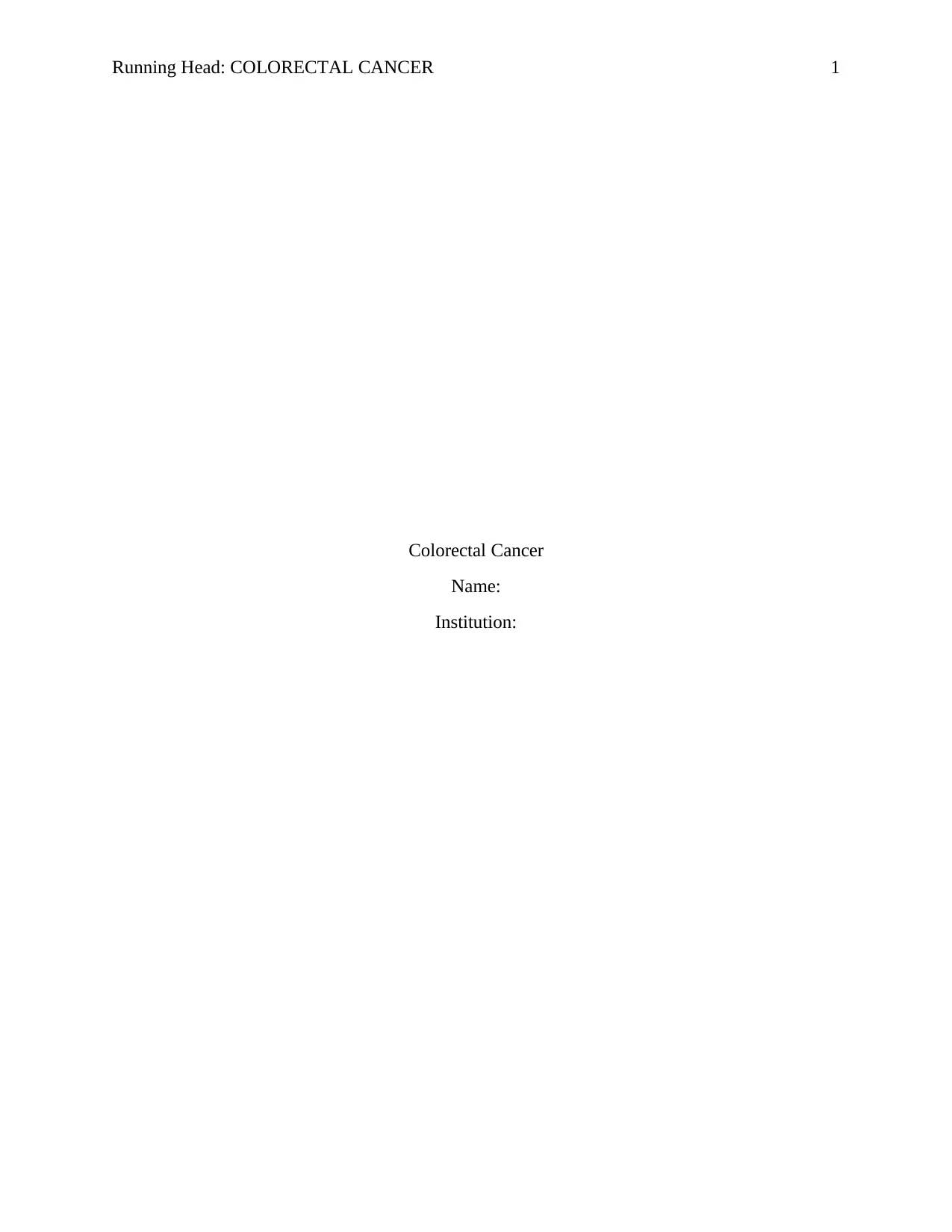
Running Head: COLORECTAL CANCER 1
Colorectal Cancer
Name:
Institution:
Colorectal Cancer
Name:
Institution:
Paraphrase This Document
Need a fresh take? Get an instant paraphrase of this document with our AI Paraphraser
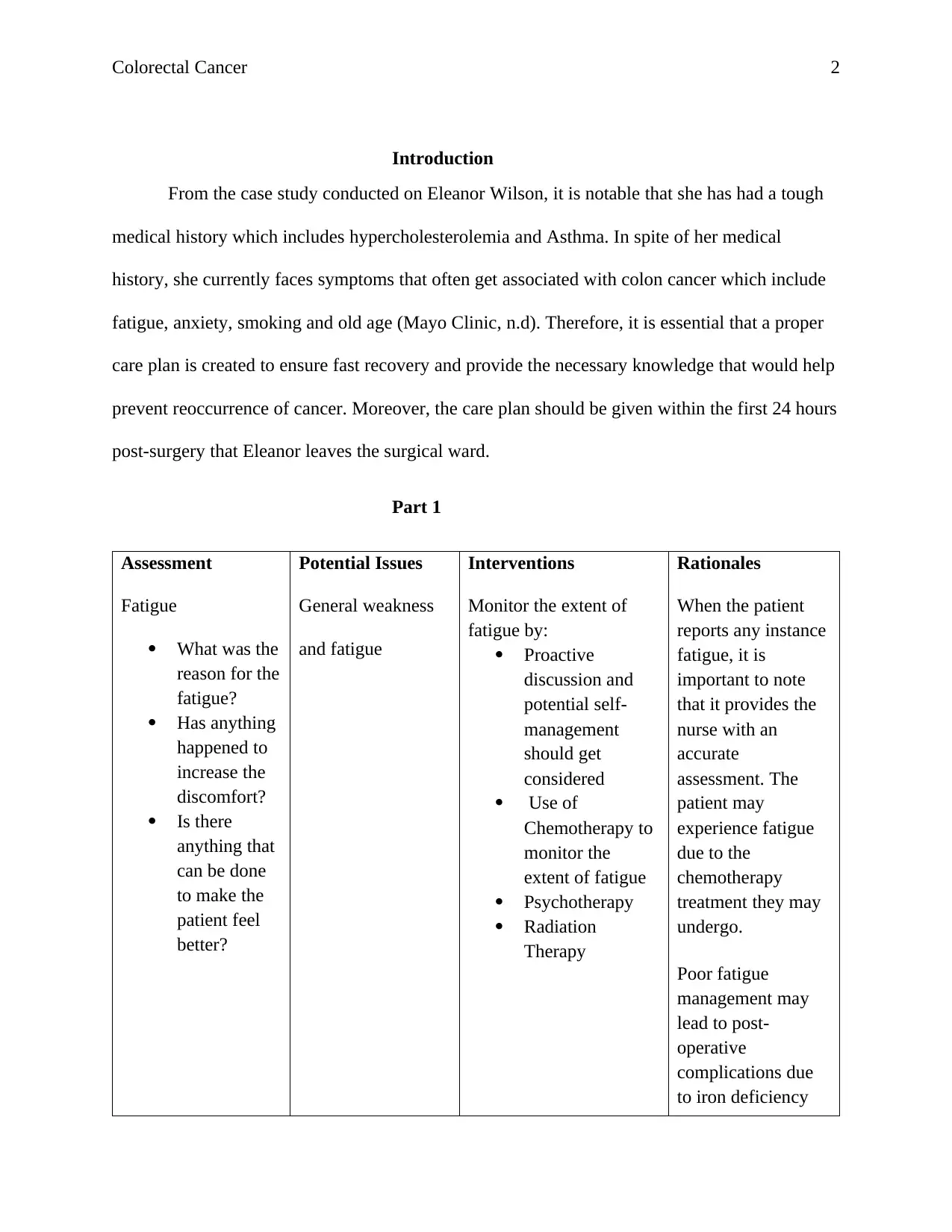
Colorectal Cancer 2
Introduction
From the case study conducted on Eleanor Wilson, it is notable that she has had a tough
medical history which includes hypercholesterolemia and Asthma. In spite of her medical
history, she currently faces symptoms that often get associated with colon cancer which include
fatigue, anxiety, smoking and old age (Mayo Clinic, n.d). Therefore, it is essential that a proper
care plan is created to ensure fast recovery and provide the necessary knowledge that would help
prevent reoccurrence of cancer. Moreover, the care plan should be given within the first 24 hours
post-surgery that Eleanor leaves the surgical ward.
Part 1
Assessment
Fatigue
What was the
reason for the
fatigue?
Has anything
happened to
increase the
discomfort?
Is there
anything that
can be done
to make the
patient feel
better?
Potential Issues
General weakness
and fatigue
Interventions
Monitor the extent of
fatigue by:
Proactive
discussion and
potential self-
management
should get
considered
Use of
Chemotherapy to
monitor the
extent of fatigue
Psychotherapy
Radiation
Therapy
Rationales
When the patient
reports any instance
fatigue, it is
important to note
that it provides the
nurse with an
accurate
assessment. The
patient may
experience fatigue
due to the
chemotherapy
treatment they may
undergo.
Poor fatigue
management may
lead to post-
operative
complications due
to iron deficiency
Introduction
From the case study conducted on Eleanor Wilson, it is notable that she has had a tough
medical history which includes hypercholesterolemia and Asthma. In spite of her medical
history, she currently faces symptoms that often get associated with colon cancer which include
fatigue, anxiety, smoking and old age (Mayo Clinic, n.d). Therefore, it is essential that a proper
care plan is created to ensure fast recovery and provide the necessary knowledge that would help
prevent reoccurrence of cancer. Moreover, the care plan should be given within the first 24 hours
post-surgery that Eleanor leaves the surgical ward.
Part 1
Assessment
Fatigue
What was the
reason for the
fatigue?
Has anything
happened to
increase the
discomfort?
Is there
anything that
can be done
to make the
patient feel
better?
Potential Issues
General weakness
and fatigue
Interventions
Monitor the extent of
fatigue by:
Proactive
discussion and
potential self-
management
should get
considered
Use of
Chemotherapy to
monitor the
extent of fatigue
Psychotherapy
Radiation
Therapy
Rationales
When the patient
reports any instance
fatigue, it is
important to note
that it provides the
nurse with an
accurate
assessment. The
patient may
experience fatigue
due to the
chemotherapy
treatment they may
undergo.
Poor fatigue
management may
lead to post-
operative
complications due
to iron deficiency
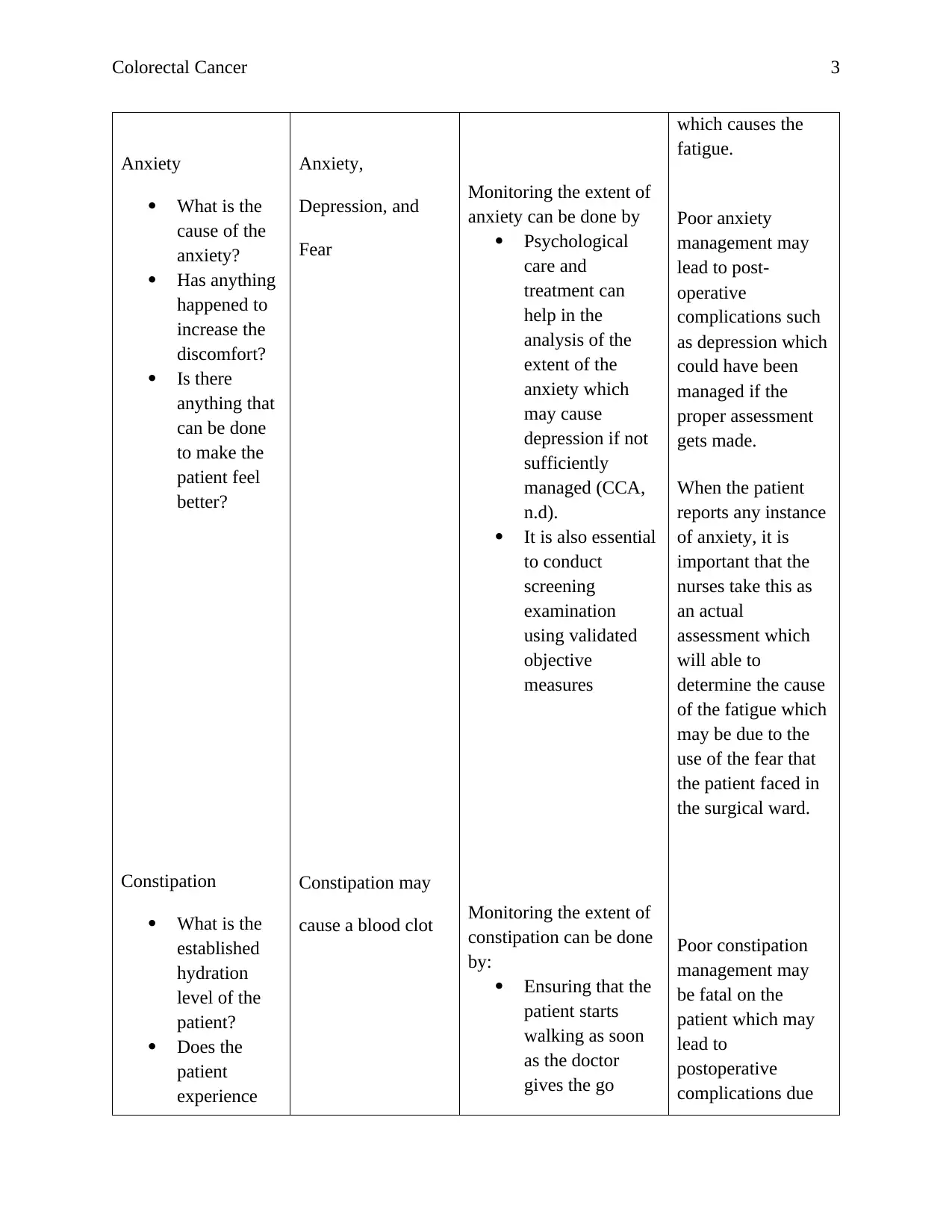
Colorectal Cancer 3
Anxiety
What is the
cause of the
anxiety?
Has anything
happened to
increase the
discomfort?
Is there
anything that
can be done
to make the
patient feel
better?
Constipation
What is the
established
hydration
level of the
patient?
Does the
patient
experience
Anxiety,
Depression, and
Fear
Constipation may
cause a blood clot
Monitoring the extent of
anxiety can be done by
Psychological
care and
treatment can
help in the
analysis of the
extent of the
anxiety which
may cause
depression if not
sufficiently
managed (CCA,
n.d).
It is also essential
to conduct
screening
examination
using validated
objective
measures
Monitoring the extent of
constipation can be done
by:
Ensuring that the
patient starts
walking as soon
as the doctor
gives the go
which causes the
fatigue.
Poor anxiety
management may
lead to post-
operative
complications such
as depression which
could have been
managed if the
proper assessment
gets made.
When the patient
reports any instance
of anxiety, it is
important that the
nurses take this as
an actual
assessment which
will able to
determine the cause
of the fatigue which
may be due to the
use of the fear that
the patient faced in
the surgical ward.
Poor constipation
management may
be fatal on the
patient which may
lead to
postoperative
complications due
Anxiety
What is the
cause of the
anxiety?
Has anything
happened to
increase the
discomfort?
Is there
anything that
can be done
to make the
patient feel
better?
Constipation
What is the
established
hydration
level of the
patient?
Does the
patient
experience
Anxiety,
Depression, and
Fear
Constipation may
cause a blood clot
Monitoring the extent of
anxiety can be done by
Psychological
care and
treatment can
help in the
analysis of the
extent of the
anxiety which
may cause
depression if not
sufficiently
managed (CCA,
n.d).
It is also essential
to conduct
screening
examination
using validated
objective
measures
Monitoring the extent of
constipation can be done
by:
Ensuring that the
patient starts
walking as soon
as the doctor
gives the go
which causes the
fatigue.
Poor anxiety
management may
lead to post-
operative
complications such
as depression which
could have been
managed if the
proper assessment
gets made.
When the patient
reports any instance
of anxiety, it is
important that the
nurses take this as
an actual
assessment which
will able to
determine the cause
of the fatigue which
may be due to the
use of the fear that
the patient faced in
the surgical ward.
Poor constipation
management may
be fatal on the
patient which may
lead to
postoperative
complications due
⊘ This is a preview!⊘
Do you want full access?
Subscribe today to unlock all pages.

Trusted by 1+ million students worldwide
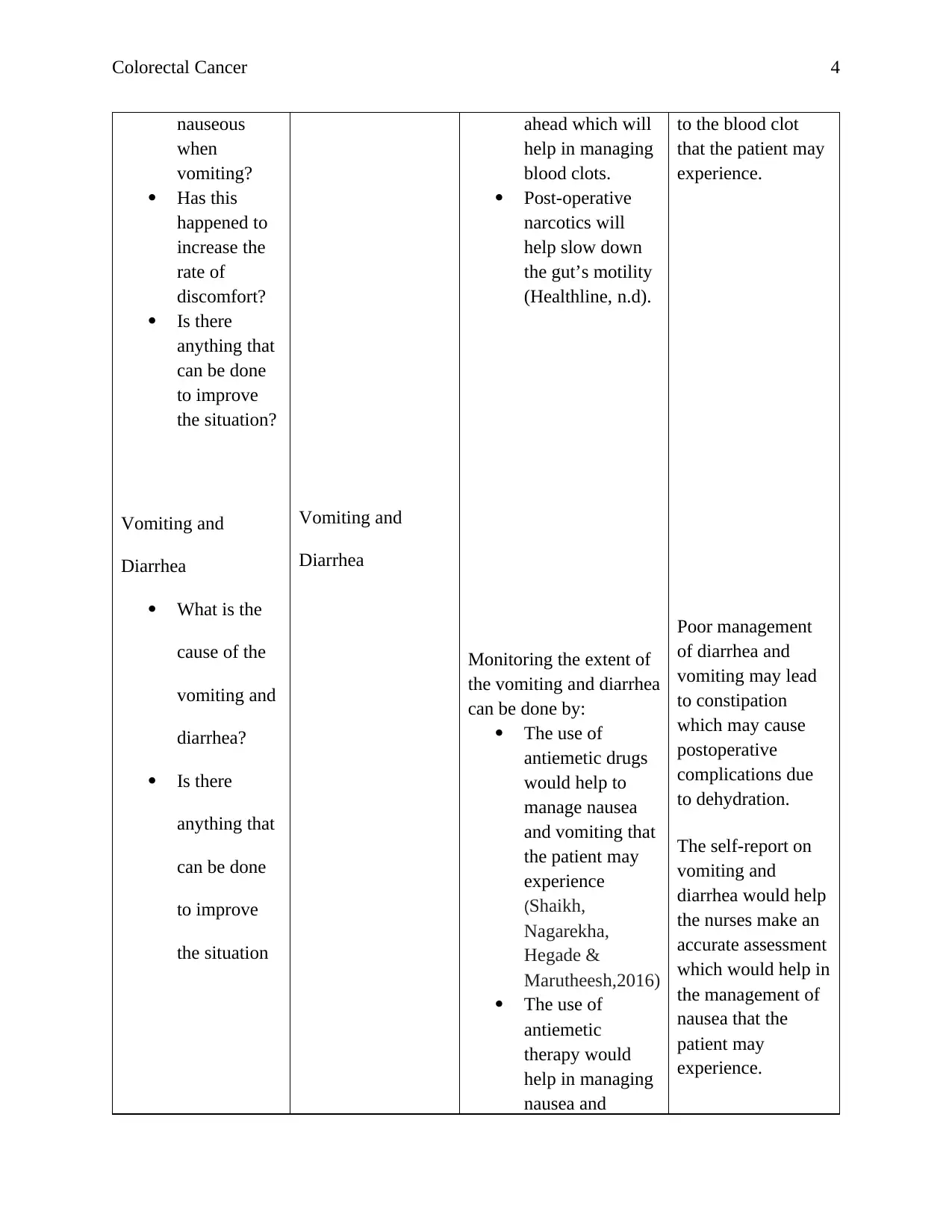
Colorectal Cancer 4
nauseous
when
vomiting?
Has this
happened to
increase the
rate of
discomfort?
Is there
anything that
can be done
to improve
the situation?
Vomiting and
Diarrhea
What is the
cause of the
vomiting and
diarrhea?
Is there
anything that
can be done
to improve
the situation
Vomiting and
Diarrhea
ahead which will
help in managing
blood clots.
Post-operative
narcotics will
help slow down
the gut’s motility
(Healthline, n.d).
Monitoring the extent of
the vomiting and diarrhea
can be done by:
The use of
antiemetic drugs
would help to
manage nausea
and vomiting that
the patient may
experience
(Shaikh,
Nagarekha,
Hegade &
Marutheesh,2016)
The use of
antiemetic
therapy would
help in managing
nausea and
to the blood clot
that the patient may
experience.
Poor management
of diarrhea and
vomiting may lead
to constipation
which may cause
postoperative
complications due
to dehydration.
The self-report on
vomiting and
diarrhea would help
the nurses make an
accurate assessment
which would help in
the management of
nausea that the
patient may
experience.
nauseous
when
vomiting?
Has this
happened to
increase the
rate of
discomfort?
Is there
anything that
can be done
to improve
the situation?
Vomiting and
Diarrhea
What is the
cause of the
vomiting and
diarrhea?
Is there
anything that
can be done
to improve
the situation
Vomiting and
Diarrhea
ahead which will
help in managing
blood clots.
Post-operative
narcotics will
help slow down
the gut’s motility
(Healthline, n.d).
Monitoring the extent of
the vomiting and diarrhea
can be done by:
The use of
antiemetic drugs
would help to
manage nausea
and vomiting that
the patient may
experience
(Shaikh,
Nagarekha,
Hegade &
Marutheesh,2016)
The use of
antiemetic
therapy would
help in managing
nausea and
to the blood clot
that the patient may
experience.
Poor management
of diarrhea and
vomiting may lead
to constipation
which may cause
postoperative
complications due
to dehydration.
The self-report on
vomiting and
diarrhea would help
the nurses make an
accurate assessment
which would help in
the management of
nausea that the
patient may
experience.
Paraphrase This Document
Need a fresh take? Get an instant paraphrase of this document with our AI Paraphraser
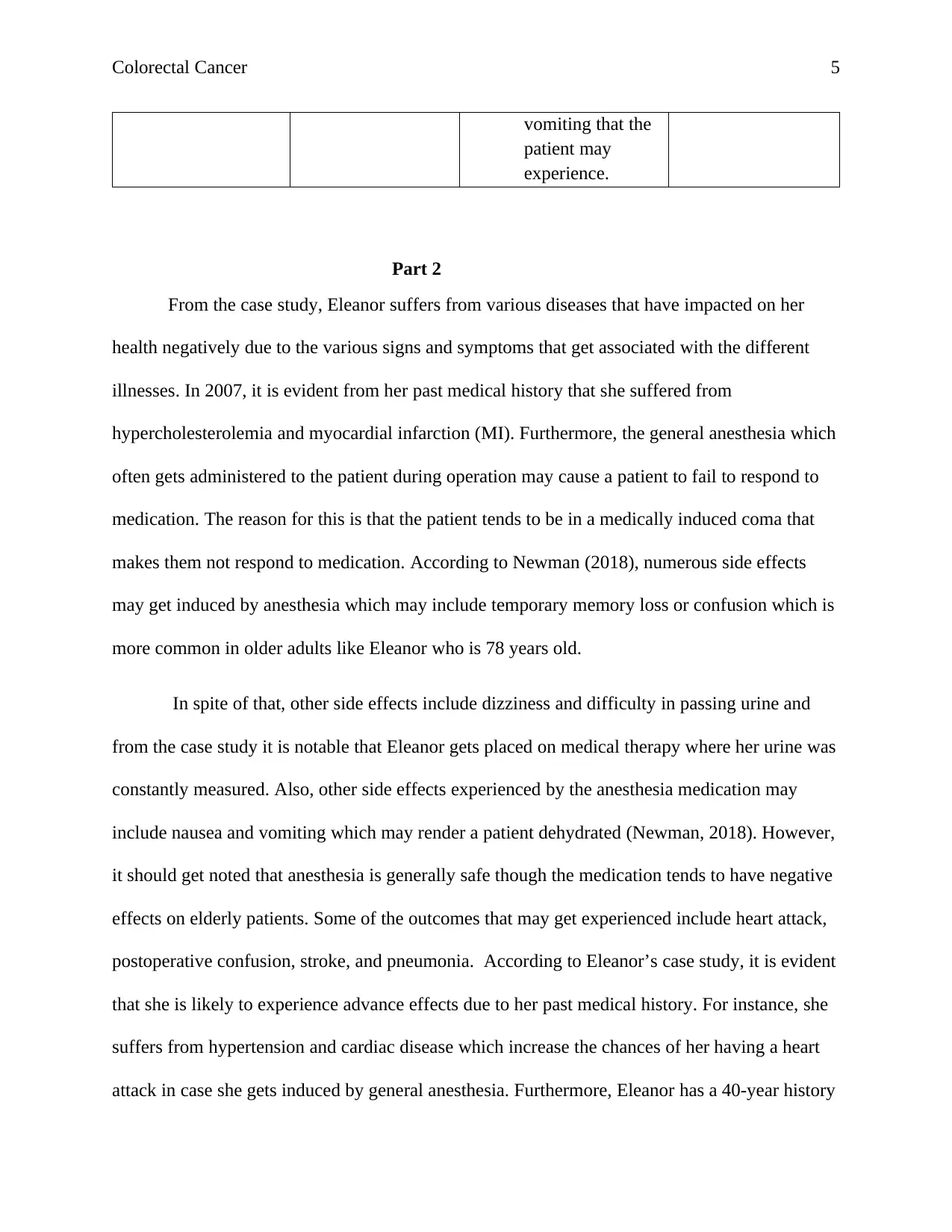
Colorectal Cancer 5
vomiting that the
patient may
experience.
Part 2
From the case study, Eleanor suffers from various diseases that have impacted on her
health negatively due to the various signs and symptoms that get associated with the different
illnesses. In 2007, it is evident from her past medical history that she suffered from
hypercholesterolemia and myocardial infarction (MI). Furthermore, the general anesthesia which
often gets administered to the patient during operation may cause a patient to fail to respond to
medication. The reason for this is that the patient tends to be in a medically induced coma that
makes them not respond to medication. According to Newman (2018), numerous side effects
may get induced by anesthesia which may include temporary memory loss or confusion which is
more common in older adults like Eleanor who is 78 years old.
In spite of that, other side effects include dizziness and difficulty in passing urine and
from the case study it is notable that Eleanor gets placed on medical therapy where her urine was
constantly measured. Also, other side effects experienced by the anesthesia medication may
include nausea and vomiting which may render a patient dehydrated (Newman, 2018). However,
it should get noted that anesthesia is generally safe though the medication tends to have negative
effects on elderly patients. Some of the outcomes that may get experienced include heart attack,
postoperative confusion, stroke, and pneumonia. According to Eleanor’s case study, it is evident
that she is likely to experience advance effects due to her past medical history. For instance, she
suffers from hypertension and cardiac disease which increase the chances of her having a heart
attack in case she gets induced by general anesthesia. Furthermore, Eleanor has a 40-year history
vomiting that the
patient may
experience.
Part 2
From the case study, Eleanor suffers from various diseases that have impacted on her
health negatively due to the various signs and symptoms that get associated with the different
illnesses. In 2007, it is evident from her past medical history that she suffered from
hypercholesterolemia and myocardial infarction (MI). Furthermore, the general anesthesia which
often gets administered to the patient during operation may cause a patient to fail to respond to
medication. The reason for this is that the patient tends to be in a medically induced coma that
makes them not respond to medication. According to Newman (2018), numerous side effects
may get induced by anesthesia which may include temporary memory loss or confusion which is
more common in older adults like Eleanor who is 78 years old.
In spite of that, other side effects include dizziness and difficulty in passing urine and
from the case study it is notable that Eleanor gets placed on medical therapy where her urine was
constantly measured. Also, other side effects experienced by the anesthesia medication may
include nausea and vomiting which may render a patient dehydrated (Newman, 2018). However,
it should get noted that anesthesia is generally safe though the medication tends to have negative
effects on elderly patients. Some of the outcomes that may get experienced include heart attack,
postoperative confusion, stroke, and pneumonia. According to Eleanor’s case study, it is evident
that she is likely to experience advance effects due to her past medical history. For instance, she
suffers from hypertension and cardiac disease which increase the chances of her having a heart
attack in case she gets induced by general anesthesia. Furthermore, Eleanor has a 40-year history
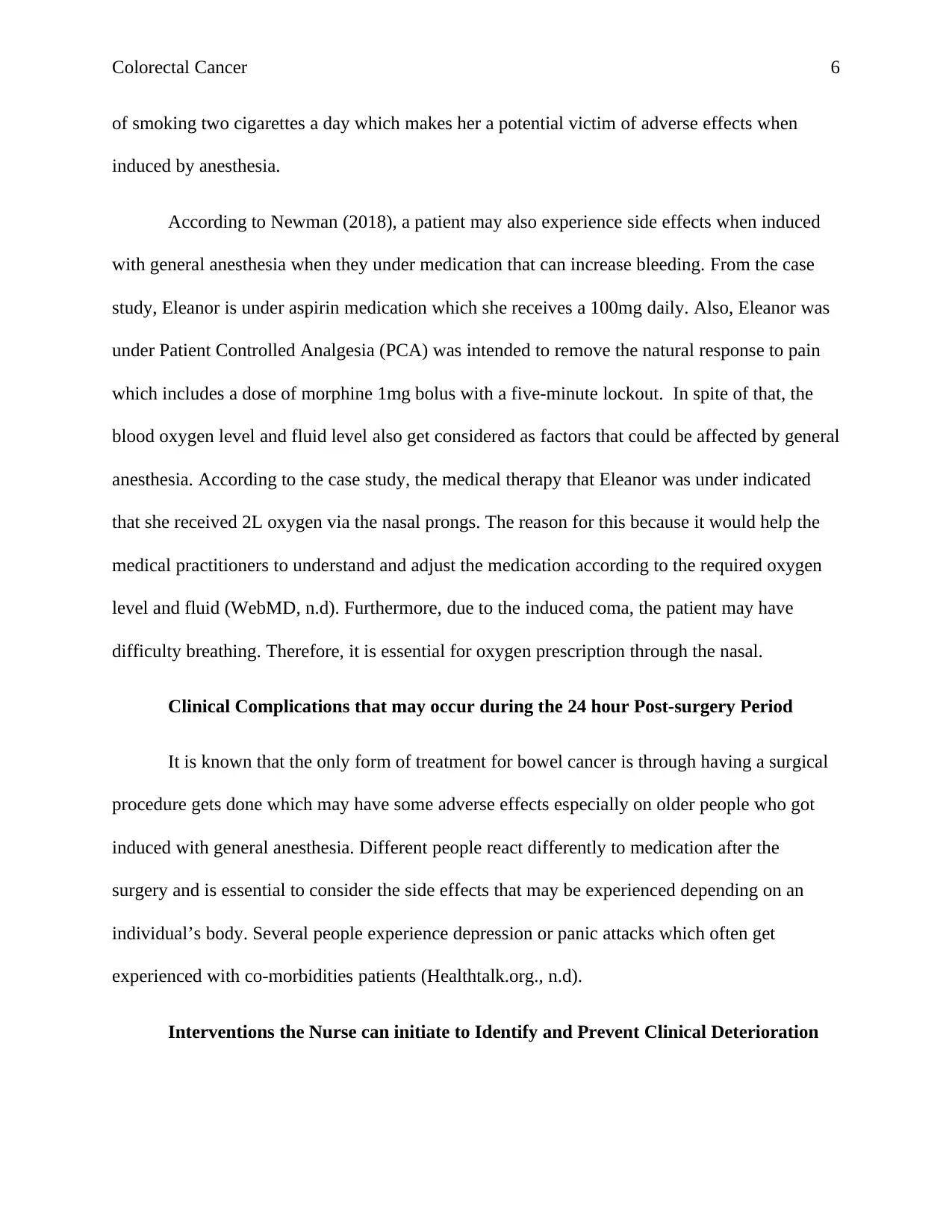
Colorectal Cancer 6
of smoking two cigarettes a day which makes her a potential victim of adverse effects when
induced by anesthesia.
According to Newman (2018), a patient may also experience side effects when induced
with general anesthesia when they under medication that can increase bleeding. From the case
study, Eleanor is under aspirin medication which she receives a 100mg daily. Also, Eleanor was
under Patient Controlled Analgesia (PCA) was intended to remove the natural response to pain
which includes a dose of morphine 1mg bolus with a five-minute lockout. In spite of that, the
blood oxygen level and fluid level also get considered as factors that could be affected by general
anesthesia. According to the case study, the medical therapy that Eleanor was under indicated
that she received 2L oxygen via the nasal prongs. The reason for this because it would help the
medical practitioners to understand and adjust the medication according to the required oxygen
level and fluid (WebMD, n.d). Furthermore, due to the induced coma, the patient may have
difficulty breathing. Therefore, it is essential for oxygen prescription through the nasal.
Clinical Complications that may occur during the 24 hour Post-surgery Period
It is known that the only form of treatment for bowel cancer is through having a surgical
procedure gets done which may have some adverse effects especially on older people who got
induced with general anesthesia. Different people react differently to medication after the
surgery and is essential to consider the side effects that may be experienced depending on an
individual’s body. Several people experience depression or panic attacks which often get
experienced with co-morbidities patients (Healthtalk.org., n.d).
Interventions the Nurse can initiate to Identify and Prevent Clinical Deterioration
of smoking two cigarettes a day which makes her a potential victim of adverse effects when
induced by anesthesia.
According to Newman (2018), a patient may also experience side effects when induced
with general anesthesia when they under medication that can increase bleeding. From the case
study, Eleanor is under aspirin medication which she receives a 100mg daily. Also, Eleanor was
under Patient Controlled Analgesia (PCA) was intended to remove the natural response to pain
which includes a dose of morphine 1mg bolus with a five-minute lockout. In spite of that, the
blood oxygen level and fluid level also get considered as factors that could be affected by general
anesthesia. According to the case study, the medical therapy that Eleanor was under indicated
that she received 2L oxygen via the nasal prongs. The reason for this because it would help the
medical practitioners to understand and adjust the medication according to the required oxygen
level and fluid (WebMD, n.d). Furthermore, due to the induced coma, the patient may have
difficulty breathing. Therefore, it is essential for oxygen prescription through the nasal.
Clinical Complications that may occur during the 24 hour Post-surgery Period
It is known that the only form of treatment for bowel cancer is through having a surgical
procedure gets done which may have some adverse effects especially on older people who got
induced with general anesthesia. Different people react differently to medication after the
surgery and is essential to consider the side effects that may be experienced depending on an
individual’s body. Several people experience depression or panic attacks which often get
experienced with co-morbidities patients (Healthtalk.org., n.d).
Interventions the Nurse can initiate to Identify and Prevent Clinical Deterioration
⊘ This is a preview!⊘
Do you want full access?
Subscribe today to unlock all pages.

Trusted by 1+ million students worldwide
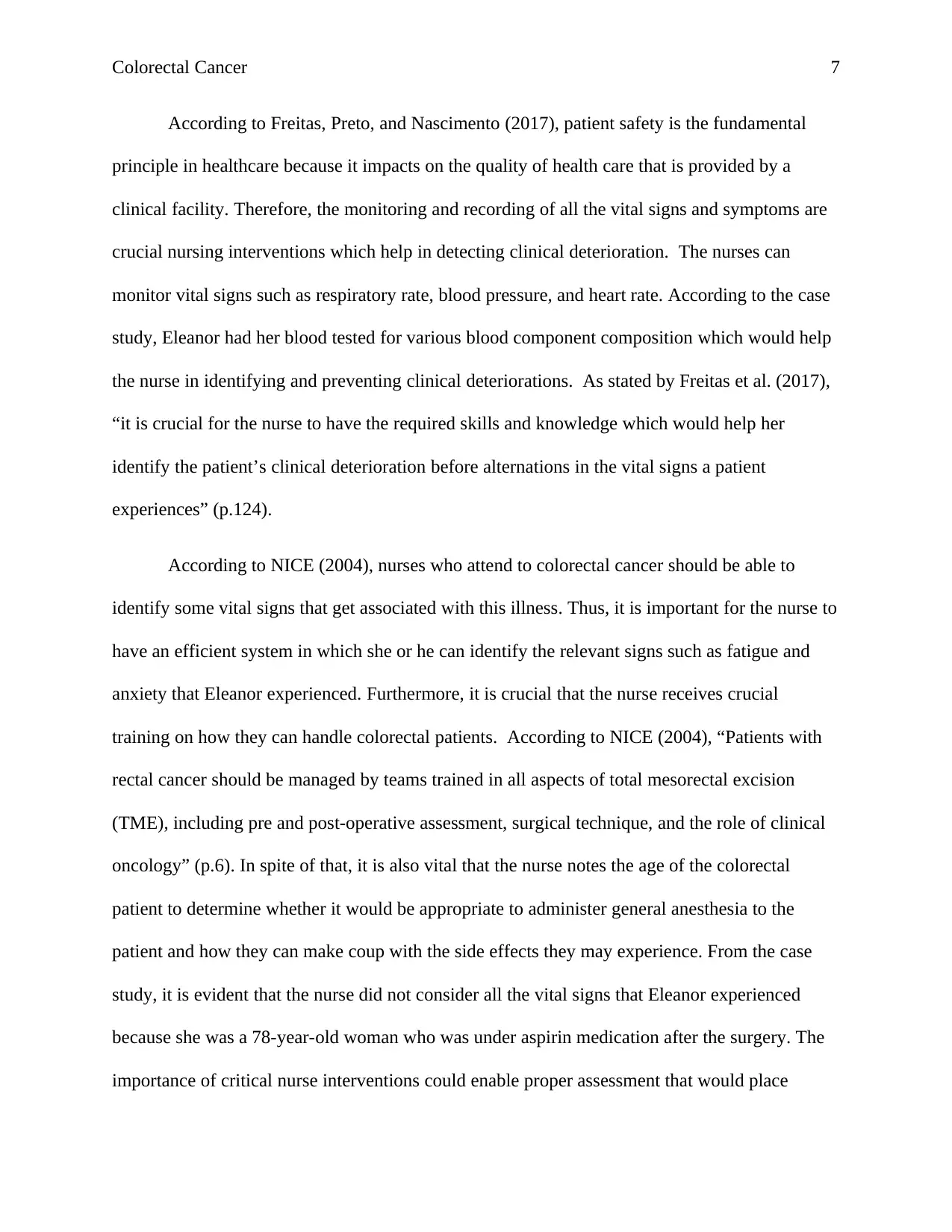
Colorectal Cancer 7
According to Freitas, Preto, and Nascimento (2017), patient safety is the fundamental
principle in healthcare because it impacts on the quality of health care that is provided by a
clinical facility. Therefore, the monitoring and recording of all the vital signs and symptoms are
crucial nursing interventions which help in detecting clinical deterioration. The nurses can
monitor vital signs such as respiratory rate, blood pressure, and heart rate. According to the case
study, Eleanor had her blood tested for various blood component composition which would help
the nurse in identifying and preventing clinical deteriorations. As stated by Freitas et al. (2017),
“it is crucial for the nurse to have the required skills and knowledge which would help her
identify the patient’s clinical deterioration before alternations in the vital signs a patient
experiences” (p.124).
According to NICE (2004), nurses who attend to colorectal cancer should be able to
identify some vital signs that get associated with this illness. Thus, it is important for the nurse to
have an efficient system in which she or he can identify the relevant signs such as fatigue and
anxiety that Eleanor experienced. Furthermore, it is crucial that the nurse receives crucial
training on how they can handle colorectal patients. According to NICE (2004), “Patients with
rectal cancer should be managed by teams trained in all aspects of total mesorectal excision
(TME), including pre and post-operative assessment, surgical technique, and the role of clinical
oncology” (p.6). In spite of that, it is also vital that the nurse notes the age of the colorectal
patient to determine whether it would be appropriate to administer general anesthesia to the
patient and how they can make coup with the side effects they may experience. From the case
study, it is evident that the nurse did not consider all the vital signs that Eleanor experienced
because she was a 78-year-old woman who was under aspirin medication after the surgery. The
importance of critical nurse interventions could enable proper assessment that would place
According to Freitas, Preto, and Nascimento (2017), patient safety is the fundamental
principle in healthcare because it impacts on the quality of health care that is provided by a
clinical facility. Therefore, the monitoring and recording of all the vital signs and symptoms are
crucial nursing interventions which help in detecting clinical deterioration. The nurses can
monitor vital signs such as respiratory rate, blood pressure, and heart rate. According to the case
study, Eleanor had her blood tested for various blood component composition which would help
the nurse in identifying and preventing clinical deteriorations. As stated by Freitas et al. (2017),
“it is crucial for the nurse to have the required skills and knowledge which would help her
identify the patient’s clinical deterioration before alternations in the vital signs a patient
experiences” (p.124).
According to NICE (2004), nurses who attend to colorectal cancer should be able to
identify some vital signs that get associated with this illness. Thus, it is important for the nurse to
have an efficient system in which she or he can identify the relevant signs such as fatigue and
anxiety that Eleanor experienced. Furthermore, it is crucial that the nurse receives crucial
training on how they can handle colorectal patients. According to NICE (2004), “Patients with
rectal cancer should be managed by teams trained in all aspects of total mesorectal excision
(TME), including pre and post-operative assessment, surgical technique, and the role of clinical
oncology” (p.6). In spite of that, it is also vital that the nurse notes the age of the colorectal
patient to determine whether it would be appropriate to administer general anesthesia to the
patient and how they can make coup with the side effects they may experience. From the case
study, it is evident that the nurse did not consider all the vital signs that Eleanor experienced
because she was a 78-year-old woman who was under aspirin medication after the surgery. The
importance of critical nurse interventions could enable proper assessment that would place
Paraphrase This Document
Need a fresh take? Get an instant paraphrase of this document with our AI Paraphraser
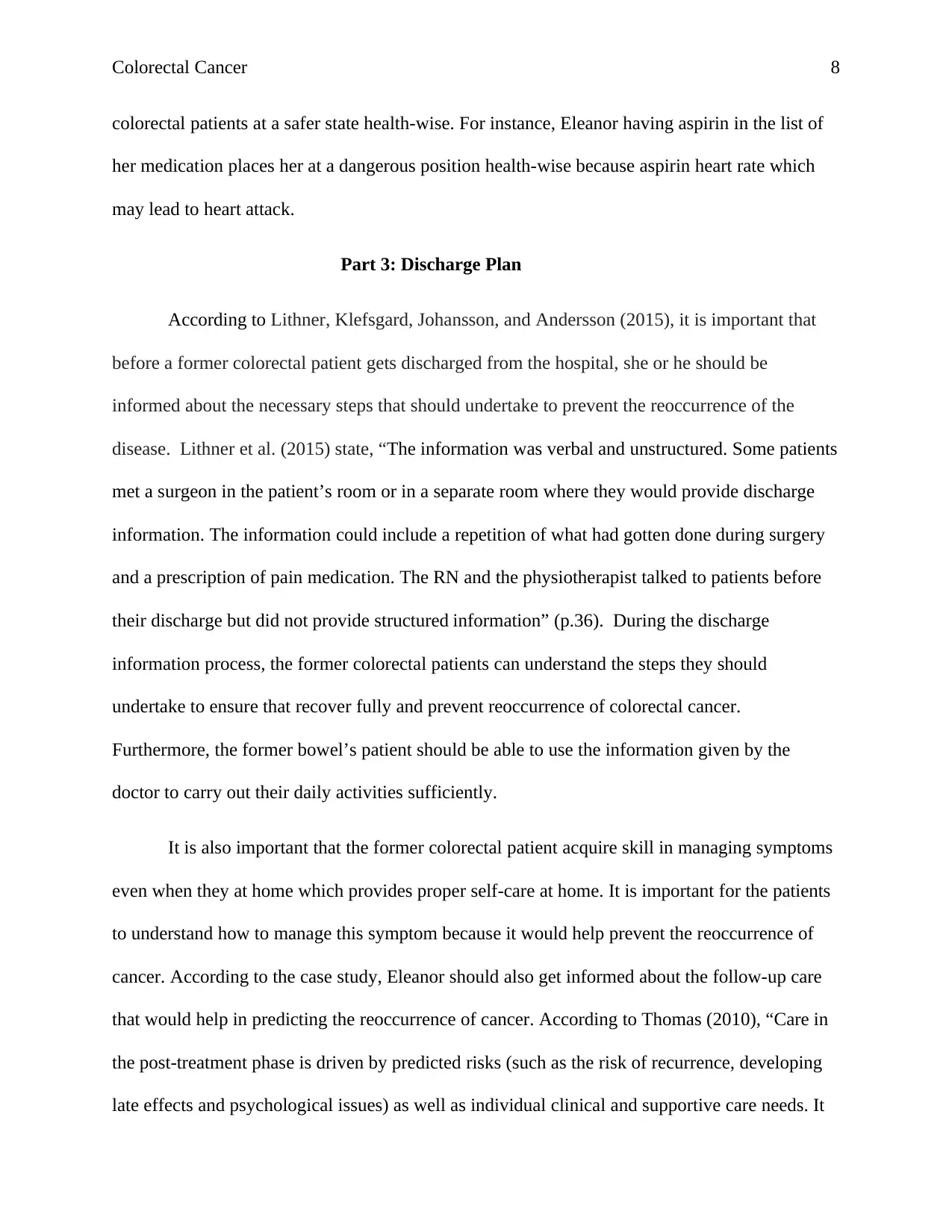
Colorectal Cancer 8
colorectal patients at a safer state health-wise. For instance, Eleanor having aspirin in the list of
her medication places her at a dangerous position health-wise because aspirin heart rate which
may lead to heart attack.
Part 3: Discharge Plan
According to Lithner, Klefsgard, Johansson, and Andersson (2015), it is important that
before a former colorectal patient gets discharged from the hospital, she or he should be
informed about the necessary steps that should undertake to prevent the reoccurrence of the
disease. Lithner et al. (2015) state, “The information was verbal and unstructured. Some patients
met a surgeon in the patient’s room or in a separate room where they would provide discharge
information. The information could include a repetition of what had gotten done during surgery
and a prescription of pain medication. The RN and the physiotherapist talked to patients before
their discharge but did not provide structured information” (p.36). During the discharge
information process, the former colorectal patients can understand the steps they should
undertake to ensure that recover fully and prevent reoccurrence of colorectal cancer.
Furthermore, the former bowel’s patient should be able to use the information given by the
doctor to carry out their daily activities sufficiently.
It is also important that the former colorectal patient acquire skill in managing symptoms
even when they at home which provides proper self-care at home. It is important for the patients
to understand how to manage this symptom because it would help prevent the reoccurrence of
cancer. According to the case study, Eleanor should also get informed about the follow-up care
that would help in predicting the reoccurrence of cancer. According to Thomas (2010), “Care in
the post-treatment phase is driven by predicted risks (such as the risk of recurrence, developing
late effects and psychological issues) as well as individual clinical and supportive care needs. It
colorectal patients at a safer state health-wise. For instance, Eleanor having aspirin in the list of
her medication places her at a dangerous position health-wise because aspirin heart rate which
may lead to heart attack.
Part 3: Discharge Plan
According to Lithner, Klefsgard, Johansson, and Andersson (2015), it is important that
before a former colorectal patient gets discharged from the hospital, she or he should be
informed about the necessary steps that should undertake to prevent the reoccurrence of the
disease. Lithner et al. (2015) state, “The information was verbal and unstructured. Some patients
met a surgeon in the patient’s room or in a separate room where they would provide discharge
information. The information could include a repetition of what had gotten done during surgery
and a prescription of pain medication. The RN and the physiotherapist talked to patients before
their discharge but did not provide structured information” (p.36). During the discharge
information process, the former colorectal patients can understand the steps they should
undertake to ensure that recover fully and prevent reoccurrence of colorectal cancer.
Furthermore, the former bowel’s patient should be able to use the information given by the
doctor to carry out their daily activities sufficiently.
It is also important that the former colorectal patient acquire skill in managing symptoms
even when they at home which provides proper self-care at home. It is important for the patients
to understand how to manage this symptom because it would help prevent the reoccurrence of
cancer. According to the case study, Eleanor should also get informed about the follow-up care
that would help in predicting the reoccurrence of cancer. According to Thomas (2010), “Care in
the post-treatment phase is driven by predicted risks (such as the risk of recurrence, developing
late effects and psychological issues) as well as individual clinical and supportive care needs. It
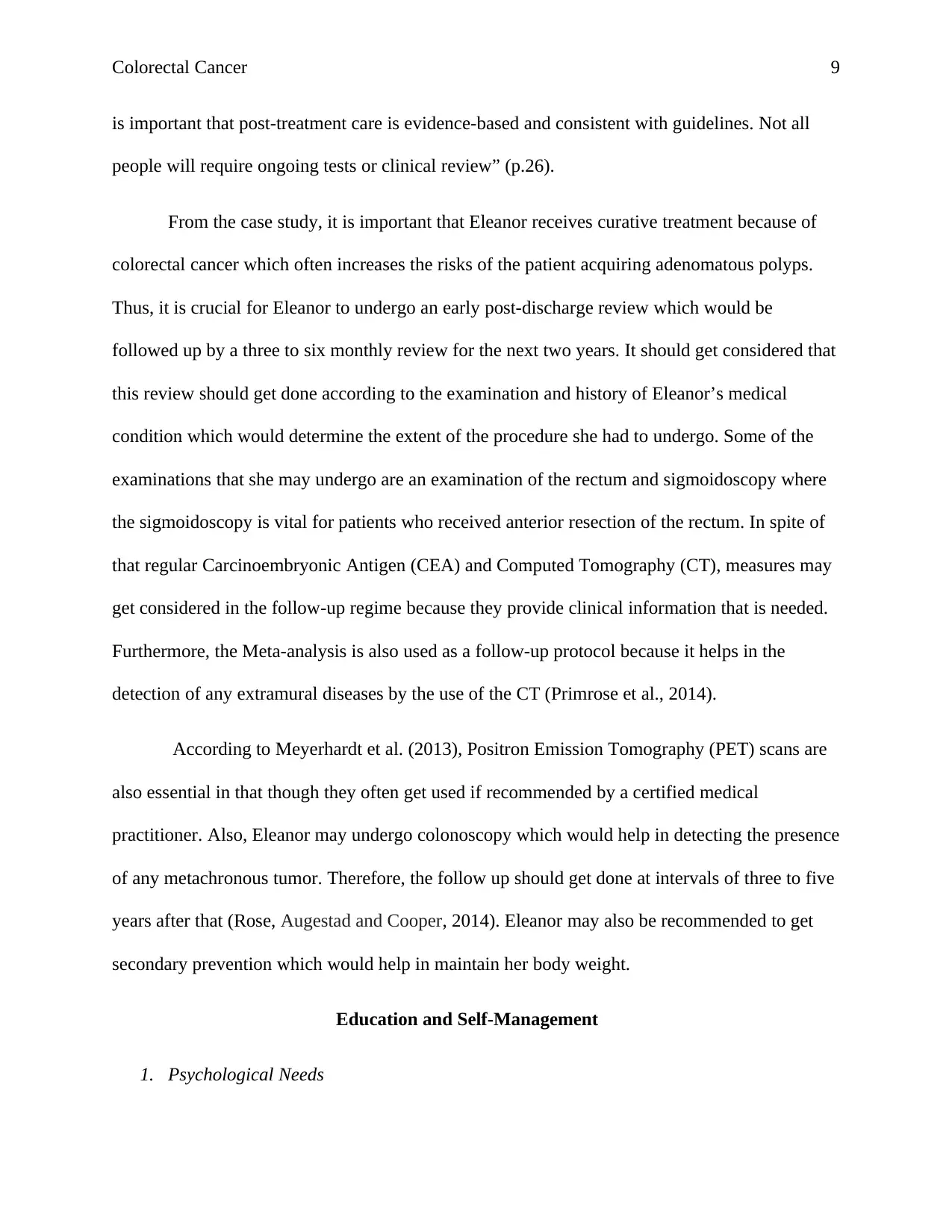
Colorectal Cancer 9
is important that post-treatment care is evidence-based and consistent with guidelines. Not all
people will require ongoing tests or clinical review” (p.26).
From the case study, it is important that Eleanor receives curative treatment because of
colorectal cancer which often increases the risks of the patient acquiring adenomatous polyps.
Thus, it is crucial for Eleanor to undergo an early post-discharge review which would be
followed up by a three to six monthly review for the next two years. It should get considered that
this review should get done according to the examination and history of Eleanor’s medical
condition which would determine the extent of the procedure she had to undergo. Some of the
examinations that she may undergo are an examination of the rectum and sigmoidoscopy where
the sigmoidoscopy is vital for patients who received anterior resection of the rectum. In spite of
that regular Carcinoembryonic Antigen (CEA) and Computed Tomography (CT), measures may
get considered in the follow-up regime because they provide clinical information that is needed.
Furthermore, the Meta-analysis is also used as a follow-up protocol because it helps in the
detection of any extramural diseases by the use of the CT (Primrose et al., 2014).
According to Meyerhardt et al. (2013), Positron Emission Tomography (PET) scans are
also essential in that though they often get used if recommended by a certified medical
practitioner. Also, Eleanor may undergo colonoscopy which would help in detecting the presence
of any metachronous tumor. Therefore, the follow up should get done at intervals of three to five
years after that (Rose, Augestad and Cooper, 2014). Eleanor may also be recommended to get
secondary prevention which would help in maintain her body weight.
Education and Self-Management
1. Psychological Needs
is important that post-treatment care is evidence-based and consistent with guidelines. Not all
people will require ongoing tests or clinical review” (p.26).
From the case study, it is important that Eleanor receives curative treatment because of
colorectal cancer which often increases the risks of the patient acquiring adenomatous polyps.
Thus, it is crucial for Eleanor to undergo an early post-discharge review which would be
followed up by a three to six monthly review for the next two years. It should get considered that
this review should get done according to the examination and history of Eleanor’s medical
condition which would determine the extent of the procedure she had to undergo. Some of the
examinations that she may undergo are an examination of the rectum and sigmoidoscopy where
the sigmoidoscopy is vital for patients who received anterior resection of the rectum. In spite of
that regular Carcinoembryonic Antigen (CEA) and Computed Tomography (CT), measures may
get considered in the follow-up regime because they provide clinical information that is needed.
Furthermore, the Meta-analysis is also used as a follow-up protocol because it helps in the
detection of any extramural diseases by the use of the CT (Primrose et al., 2014).
According to Meyerhardt et al. (2013), Positron Emission Tomography (PET) scans are
also essential in that though they often get used if recommended by a certified medical
practitioner. Also, Eleanor may undergo colonoscopy which would help in detecting the presence
of any metachronous tumor. Therefore, the follow up should get done at intervals of three to five
years after that (Rose, Augestad and Cooper, 2014). Eleanor may also be recommended to get
secondary prevention which would help in maintain her body weight.
Education and Self-Management
1. Psychological Needs
⊘ This is a preview!⊘
Do you want full access?
Subscribe today to unlock all pages.

Trusted by 1+ million students worldwide
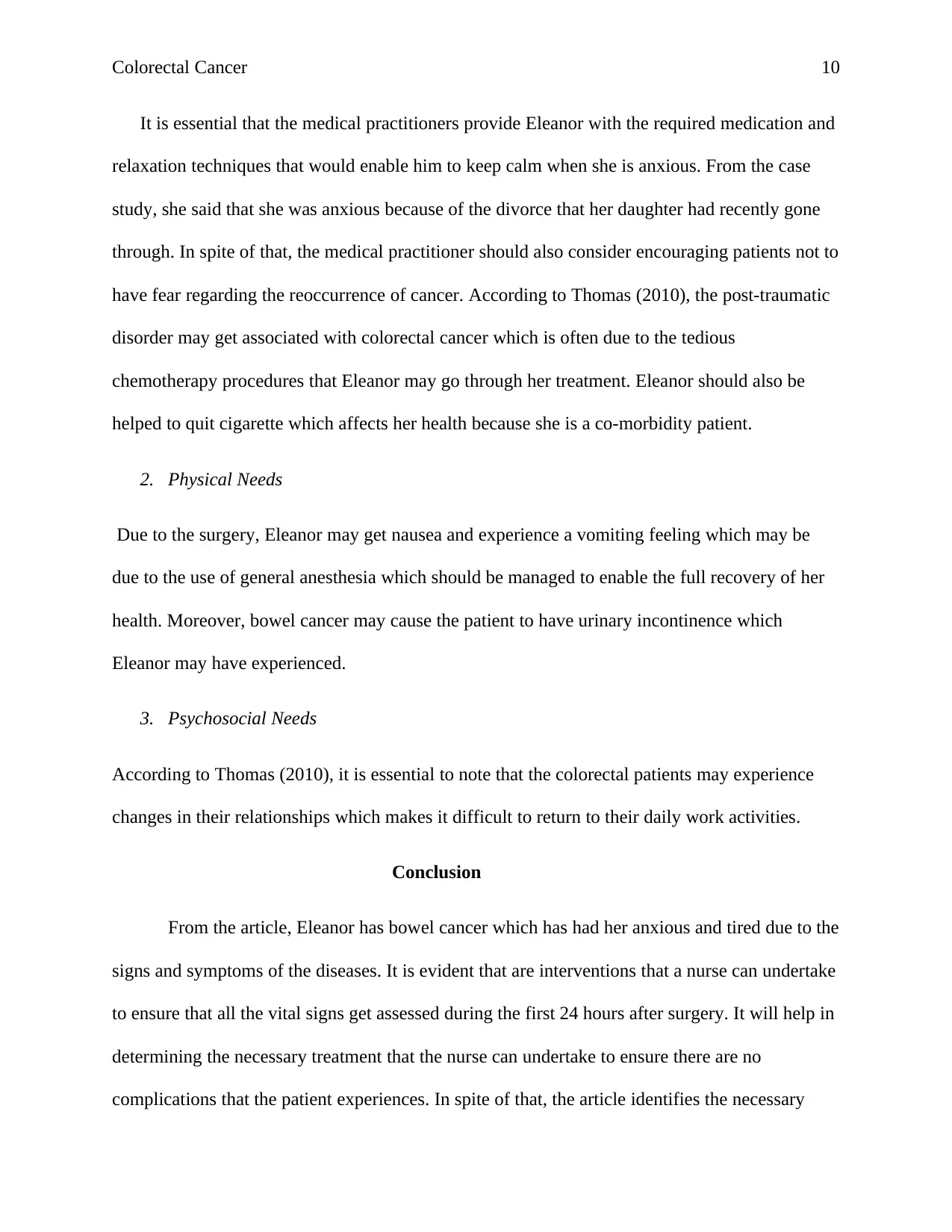
Colorectal Cancer 10
It is essential that the medical practitioners provide Eleanor with the required medication and
relaxation techniques that would enable him to keep calm when she is anxious. From the case
study, she said that she was anxious because of the divorce that her daughter had recently gone
through. In spite of that, the medical practitioner should also consider encouraging patients not to
have fear regarding the reoccurrence of cancer. According to Thomas (2010), the post-traumatic
disorder may get associated with colorectal cancer which is often due to the tedious
chemotherapy procedures that Eleanor may go through her treatment. Eleanor should also be
helped to quit cigarette which affects her health because she is a co-morbidity patient.
2. Physical Needs
Due to the surgery, Eleanor may get nausea and experience a vomiting feeling which may be
due to the use of general anesthesia which should be managed to enable the full recovery of her
health. Moreover, bowel cancer may cause the patient to have urinary incontinence which
Eleanor may have experienced.
3. Psychosocial Needs
According to Thomas (2010), it is essential to note that the colorectal patients may experience
changes in their relationships which makes it difficult to return to their daily work activities.
Conclusion
From the article, Eleanor has bowel cancer which has had her anxious and tired due to the
signs and symptoms of the diseases. It is evident that are interventions that a nurse can undertake
to ensure that all the vital signs get assessed during the first 24 hours after surgery. It will help in
determining the necessary treatment that the nurse can undertake to ensure there are no
complications that the patient experiences. In spite of that, the article identifies the necessary
It is essential that the medical practitioners provide Eleanor with the required medication and
relaxation techniques that would enable him to keep calm when she is anxious. From the case
study, she said that she was anxious because of the divorce that her daughter had recently gone
through. In spite of that, the medical practitioner should also consider encouraging patients not to
have fear regarding the reoccurrence of cancer. According to Thomas (2010), the post-traumatic
disorder may get associated with colorectal cancer which is often due to the tedious
chemotherapy procedures that Eleanor may go through her treatment. Eleanor should also be
helped to quit cigarette which affects her health because she is a co-morbidity patient.
2. Physical Needs
Due to the surgery, Eleanor may get nausea and experience a vomiting feeling which may be
due to the use of general anesthesia which should be managed to enable the full recovery of her
health. Moreover, bowel cancer may cause the patient to have urinary incontinence which
Eleanor may have experienced.
3. Psychosocial Needs
According to Thomas (2010), it is essential to note that the colorectal patients may experience
changes in their relationships which makes it difficult to return to their daily work activities.
Conclusion
From the article, Eleanor has bowel cancer which has had her anxious and tired due to the
signs and symptoms of the diseases. It is evident that are interventions that a nurse can undertake
to ensure that all the vital signs get assessed during the first 24 hours after surgery. It will help in
determining the necessary treatment that the nurse can undertake to ensure there are no
complications that the patient experiences. In spite of that, the article identifies the necessary
Paraphrase This Document
Need a fresh take? Get an instant paraphrase of this document with our AI Paraphraser

Colorectal Cancer 11
discharge plan that Eleanor may under to ensure that there is a follow-up regime that would
enable her to recover fully and prevent the reoccurrence of cancer. Also, the education and self-
management plan was essential in that it would help Eleanor to understand the signs and
symptoms that she may experience and seek medical expertise where necessary.
References
discharge plan that Eleanor may under to ensure that there is a follow-up regime that would
enable her to recover fully and prevent the reoccurrence of cancer. Also, the education and self-
management plan was essential in that it would help Eleanor to understand the signs and
symptoms that she may experience and seek medical expertise where necessary.
References
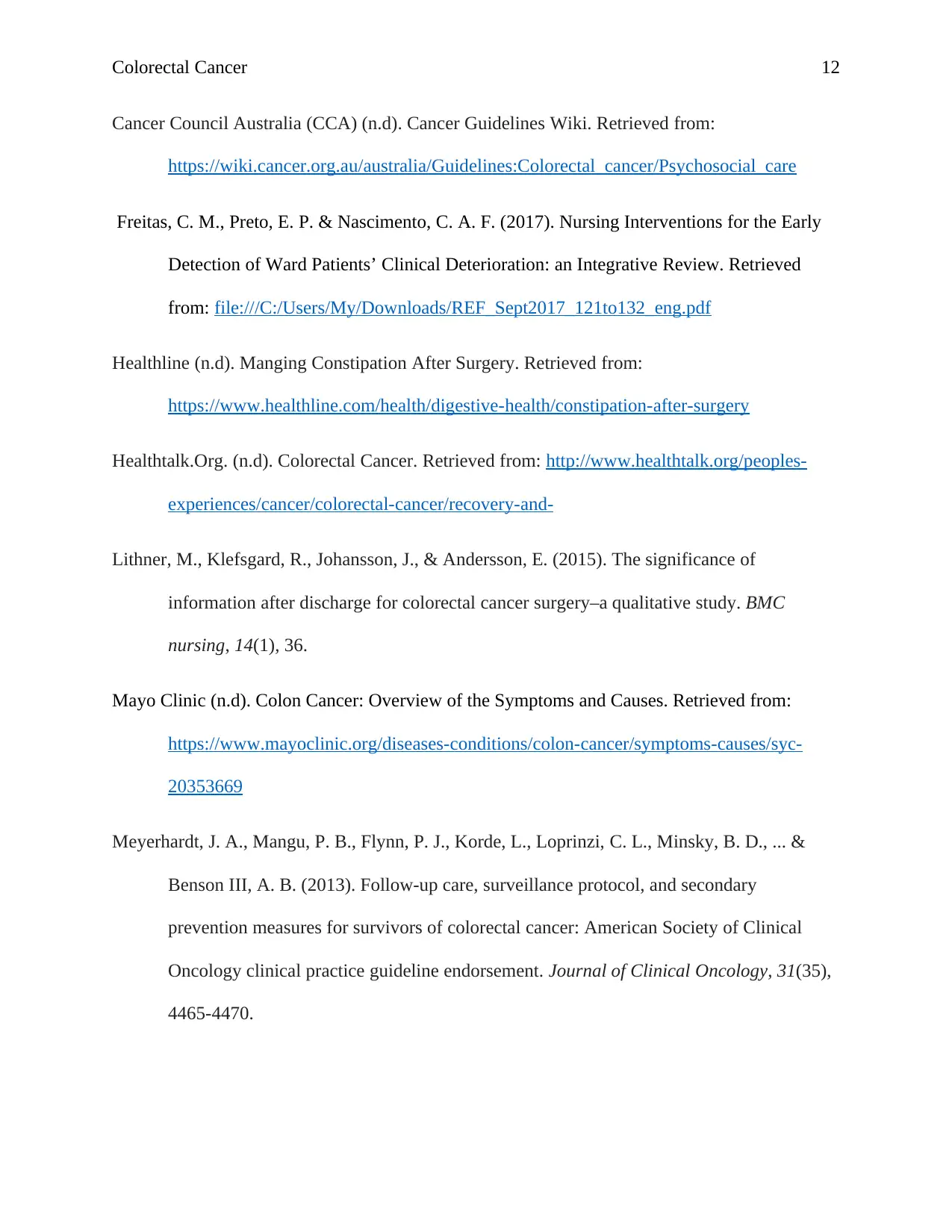
Colorectal Cancer 12
Cancer Council Australia (CCA) (n.d). Cancer Guidelines Wiki. Retrieved from:
https://wiki.cancer.org.au/australia/Guidelines:Colorectal_cancer/Psychosocial_care
Freitas, C. M., Preto, E. P. & Nascimento, C. A. F. (2017). Nursing Interventions for the Early
Detection of Ward Patients’ Clinical Deterioration: an Integrative Review. Retrieved
from: file:///C:/Users/My/Downloads/REF_Sept2017_121to132_eng.pdf
Healthline (n.d). Manging Constipation After Surgery. Retrieved from:
https://www.healthline.com/health/digestive-health/constipation-after-surgery
Healthtalk.Org. (n.d). Colorectal Cancer. Retrieved from: http://www.healthtalk.org/peoples-
experiences/cancer/colorectal-cancer/recovery-and-
Lithner, M., Klefsgard, R., Johansson, J., & Andersson, E. (2015). The significance of
information after discharge for colorectal cancer surgery–a qualitative study. BMC
nursing, 14(1), 36.
Mayo Clinic (n.d). Colon Cancer: Overview of the Symptoms and Causes. Retrieved from:
https://www.mayoclinic.org/diseases-conditions/colon-cancer/symptoms-causes/syc-
20353669
Meyerhardt, J. A., Mangu, P. B., Flynn, P. J., Korde, L., Loprinzi, C. L., Minsky, B. D., ... &
Benson III, A. B. (2013). Follow-up care, surveillance protocol, and secondary
prevention measures for survivors of colorectal cancer: American Society of Clinical
Oncology clinical practice guideline endorsement. Journal of Clinical Oncology, 31(35),
4465-4470.
Cancer Council Australia (CCA) (n.d). Cancer Guidelines Wiki. Retrieved from:
https://wiki.cancer.org.au/australia/Guidelines:Colorectal_cancer/Psychosocial_care
Freitas, C. M., Preto, E. P. & Nascimento, C. A. F. (2017). Nursing Interventions for the Early
Detection of Ward Patients’ Clinical Deterioration: an Integrative Review. Retrieved
from: file:///C:/Users/My/Downloads/REF_Sept2017_121to132_eng.pdf
Healthline (n.d). Manging Constipation After Surgery. Retrieved from:
https://www.healthline.com/health/digestive-health/constipation-after-surgery
Healthtalk.Org. (n.d). Colorectal Cancer. Retrieved from: http://www.healthtalk.org/peoples-
experiences/cancer/colorectal-cancer/recovery-and-
Lithner, M., Klefsgard, R., Johansson, J., & Andersson, E. (2015). The significance of
information after discharge for colorectal cancer surgery–a qualitative study. BMC
nursing, 14(1), 36.
Mayo Clinic (n.d). Colon Cancer: Overview of the Symptoms and Causes. Retrieved from:
https://www.mayoclinic.org/diseases-conditions/colon-cancer/symptoms-causes/syc-
20353669
Meyerhardt, J. A., Mangu, P. B., Flynn, P. J., Korde, L., Loprinzi, C. L., Minsky, B. D., ... &
Benson III, A. B. (2013). Follow-up care, surveillance protocol, and secondary
prevention measures for survivors of colorectal cancer: American Society of Clinical
Oncology clinical practice guideline endorsement. Journal of Clinical Oncology, 31(35),
4465-4470.
⊘ This is a preview!⊘
Do you want full access?
Subscribe today to unlock all pages.

Trusted by 1+ million students worldwide
1 out of 13
Your All-in-One AI-Powered Toolkit for Academic Success.
+13062052269
info@desklib.com
Available 24*7 on WhatsApp / Email
![[object Object]](/_next/static/media/star-bottom.7253800d.svg)
Unlock your academic potential
Copyright © 2020–2026 A2Z Services. All Rights Reserved. Developed and managed by ZUCOL.
